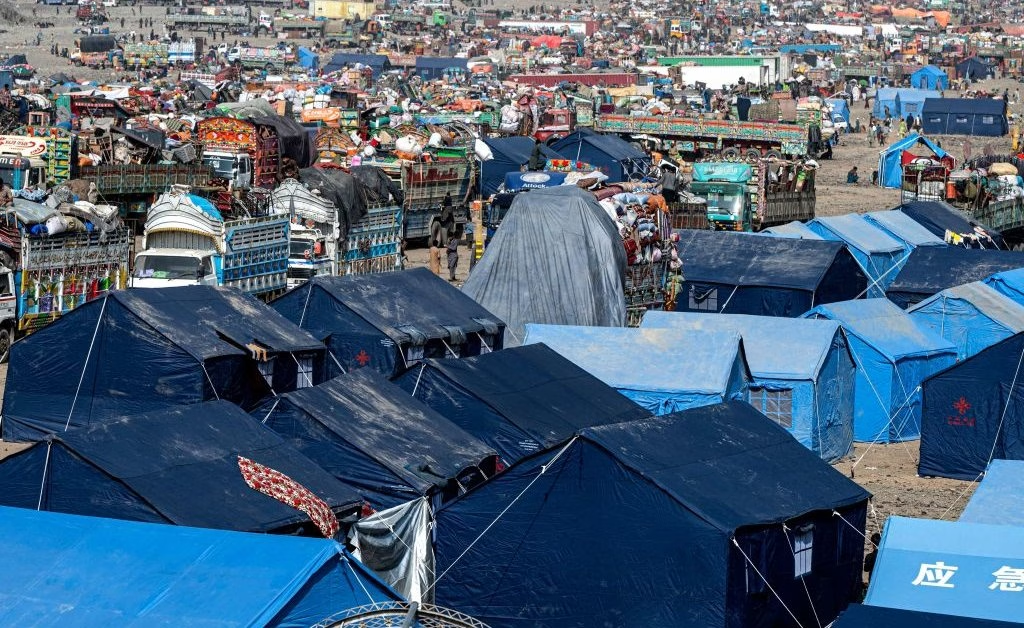PESHAWAR, Pakistan — Pakistan is set to expel 3 million Afghans from the country this year, following the expiration of a deadline for them to leave the capital and surrounding areas voluntarily on Monday.
This action marks the latest phase of a nationwide crackdown initiated in October 2023, aimed at expelling foreigners, predominantly Afghans, residing in Pakistan without legal status. The campaign has drawn criticism from rights groups, the Taliban government, and the U.N.
Initially scheduled to commence on April 1, arrests and deportations were postponed to April 10 to accommodate the Eid al-Fitr holidays, which signify the end of Ramadan, according to government documents seen by The Associated Press.
Over the past 18 months, approximately 845,000 Afghans have left Pakistan, according to figures from the International Organization for Migration.
Pakistan claims that around 3 million Afghans remain in the country, with 1,344,584 holding Proof of Registration cards and 807,402 possessing Afghan Citizen Cards. An additional 1 million Afghans are present without any legal documentation.
The Pakistani government aims to prevent the return of deported Afghans.
Authorities have urged Afghan Citizen card holders to leave Islamabad and Rawalpindi by March 31, either voluntarily or face deportation. Those with Proof of Registration can stay until June 30, while Afghans awaiting relocation to a third country must also depart by March 31.
Authorities plan to collaborate with foreign diplomatic missions to assist in the resettlement of Afghans, with deportation as an alternative if resettlement efforts prove unsuccessful.
Tens of thousands of Afghans fled to Pakistan following the Taliban takeover in 2021 and were approved for resettlement in the U.S. through a program for individuals at risk due to their work with the American government, media, aid agencies, and rights groups.
However, the U.S. refugee program was paused by President Donald Trump in January, leaving 20,000 Afghans in a state of uncertainty.
The Taliban Advocate for Dignified Return of Refugees
Afghanistan’s Refugee Ministry spokesperson, Abdul Mutalib Haqqani, stated that Pakistan’s expulsion plans are made arbitrarily, without involving the U.N. refugee agency or the Taliban government, which could fuel hatred towards Pakistan.
The Pakistani and Afghan governments have requested a managed and cooperative approach for the deportation process to allow the Afghans to return with dignity.
Two transit stations, one in Nasir Bagh, a Peshawar suburb, and another in the border town of Landi Kotal, near the Torkham crossing, will be established in Khyber Pakhtunkhwa province to facilitate deportations.
Uncertainty Shadows the Future of Afghan Refugees
Questions linger concerning the fate of children born in Pakistan to Afghan parents, Afghan couples with differing document types, and families with mixed Pakistani-Afghan parentage. Social welfare staff will reportedly be available to address such cases.
Omaid Khan, who holds an Afghan Citizen Card, faces the requirement to leave Pakistan, while his wife, with Proof of Registration, can remain until June 30. Their children lack any documentation from either country, adding to the uncertainty.
“I’m from Paktia province but have never been there and am unsure about my future,” Khan expressed.
Nazir Ahmed, born in Quetta, Pakistan, with no known connections to Afghanistan except through his late father, questions the feasibility of relocating to a country where few people are known to them.
—-
AP writer Abdul Sattar contributed to this report from Quetta, Pakistan.







